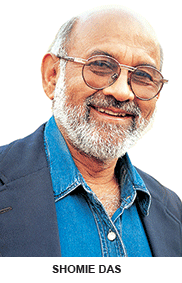 I returned to India in 1968 after graduating from Cambridge and 11 years of teaching physics at Gordonstoun — the well-known British public school. I was immediately struck by the glaring lack of hands-on learning in India’s best schools. Science is an observational subject, and doing, observing and interpreting are integral to the scientific process. Memorising laws and formulae is secondary. Yet more than 40 years later, reports of several official commissions chaired by well-known educationists indicate that teaching of science in India’s schools remains as textbooks-bound as before. Rather, dependence on memorised formulae to solve problems form the core of science teaching in the country today.
I returned to India in 1968 after graduating from Cambridge and 11 years of teaching physics at Gordonstoun — the well-known British public school. I was immediately struck by the glaring lack of hands-on learning in India’s best schools. Science is an observational subject, and doing, observing and interpreting are integral to the scientific process. Memorising laws and formulae is secondary. Yet more than 40 years later, reports of several official commissions chaired by well-known educationists indicate that teaching of science in India’s schools remains as textbooks-bound as before. Rather, dependence on memorised formulae to solve problems form the core of science teaching in the country today.
It’s particularly wasteful to stuff and clutter children’s brains with potentially defunct knowledge because we have little idea of what knowledge and skills will be required five years from now. Did we have the slightest inkling at the turn of the century that within 15 years the smartphone would be so essential for contemporary living that nearly a billion people, poor and rich, would own one? The unlikeliest of people use smartphones today and when questioned, they all say it has helped them increase their business, whether it’s a thelawala talking to a supplier who wants to know when he’s available, or a ragpicker calling for help as she has located a large dump of plastic bags!
It’s incontrovertible that Indian children are very bright — even those who have limited access to knowledge. Today with the ubiquity of television and mobile phones, children are more aware of their world than we were. Information is flowing at unimaginable speeds and children are keeping up. They learn very quickly about which button to press on the remote! They seem to be genetically hardwired. I have given a computer and an internet connection to my housemaid’s children without teaching them anything except how to switch it on and off and connect with the internet. But they’ve promptly learned to download songs and games. At this point in their lives, they don’t need to learn more. I’m confident that as time goes by, they will learn to use Google and other search engines to acquire information and enhance their knowledge.
In this rapidly changing world, the role of the teacher has also changed. This is a particularly critical and important issue. Since information is now available at an instant click, dispensing it through textbooks has become less important than how information is used. So children have to be taught how to access information and how to use it. To learn this, I believe there are five qualities that need to be developed in children to make them genuine learners. I describe them as the 5 Cs — curiosity, creativity, critical thinking, communication and learning to make choices.
In fact, human progress through the ages has depended on these five attributes of the human mind. It is curiosity that led to each and every discovery but no good would have come of it but for inherent creativity, ability to think critically and learning to make choices from available options. But all discoveries would have come to naught if others didn’t learn from them. That is the role of communication — it spreads knowledge. Keeping knowledge hidden within us would have got humankind nowhere. So, effective communication skills are as important as the other four Cs.
For 21st-century educators, the challenge is to see how these learning paradigms — the five Cs — can be effectively taught in the classroom. This is the big challenge facing us today. Pedagogies which teach the 5 Cs, in addition to reading and writing and arithmetic, need to be devised.
Moreover for teachers — and parents — it’s important to acknowledge that classroom learning needs to be supplemented with life skills and values education. So let me mention 5 more Cs: co-operation, courtesy, coexistence, compassion and courage. To live and succeed in the modern world transformed into a global village by jet travel and digital connectivity, we have to learn to collaborate and cooperate with others; to be courteous to those we disagree with; coexist with people of all beliefs and faiths; show sympathy and compassion for those less fortunate and help to uplift the weak and dispossessed.Finally we must teach students to have courage of conviction while allowing differing views to be aired.
One can add many more Cs to this list — citizenship, competitiveness, concentration and so on. But please note these skills need to be developed through classroom and co-curricular and extra-curricular education. I firmly believe that an educated individual must have a profile that enshrines these ten qualities rather than be a good parrot.
I am now in the eighth decade of my life and have been fortunate to witness and marvel at the extraordinary technologies that human creativity and ingenuity have invented. Alas, India is not among the countries in the forefront of these new technologies. The education our children receive has failed to equip them with the skill-sets they need to create and advance knowledge for the benefit of future generations.
Also Read:Personalising children’s learning
(Shomie Das is former headmaster of The Doon School, Dehradun and Lawrence School, Sanawar)























